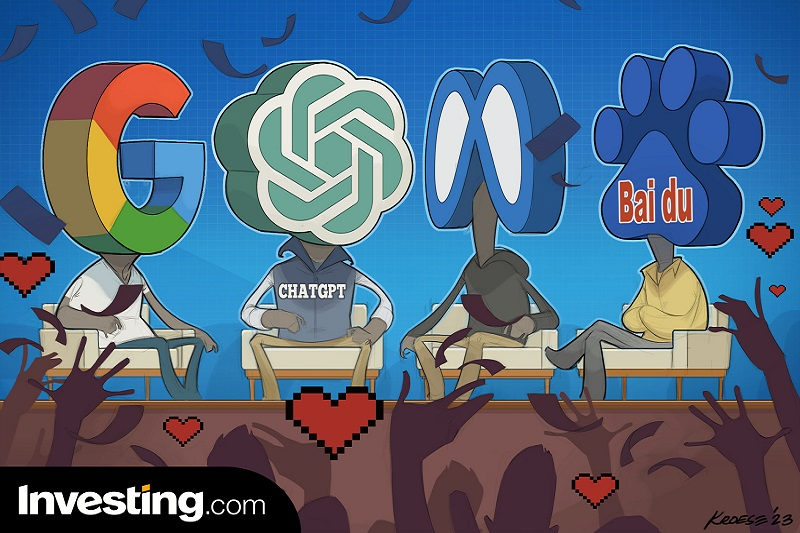By Geoffrey Smith
Investing.com -- “Sincerity,” Groucho Marx once said, “is the key to success. Once you can fake that, you've got it made.”
Generative AI-powered chatbots, of course, cannot be sincere. However, they can make a pretty good fist of faking authenticity, and will only get much better at it. According to Marxist doctrine (of the Groucho kind), it follows that the makers and controllers of the new generation of such tools, are on to a surefire winner.
The machine learning trade was doing well enough already. But the spectacular debut of ChatGPT, the Generative AI tool developed by Microsoft-backed Open AI, has had the feel of one of those periodic “holy cow!” moments that have punctuated the Internet Age since its inception.
As with the iPhone or the Cloud back in their respective beginnings, it’s hard not to be struck by the enormity of Generative AI’s potential. Former Treasury Secretary Lawrence Summers may not be everyone’s cup of tea, but he does not use phrases like “the most important general-purpose technology since the wheel or fire” lightly.
Consultants IDC estimate that the global AI market – of which Generative AI is only part - will be worth some $326 billion by 2025, as the new tools radically broaden the use of machine learning.
But guessing where and how that money is generated is another matter. Microsoft’s AI day three weeks ago focused on incorporating ChatGPT capabilities into its in-house search engine Bing and its browser Edge, two tools that are the gateway to the limitless world of the Internet for millions.
These are areas where Microsoft (NASDAQ:MSFT) currently has a clear deficit to make up vis-à-vis Alphabet’s Google (NASDAQ:GOOGL), with its dominant search engine and its user-friendly Chrome browser. CEO Satya Nadella has said that every extra 1% share of the global search market would add billions to the Redmond-based giant’s revenue.
However, analysts at Morgan Stanley reckon that the big opportunities created by AI for Microsoft will be elsewhere: in pushing yet more business the way of its Cloud-hosting operation Azure, and in enhancing its Office suite of professional tools, where ChatGPT can perform like a sort of supercharged reboot of the dreaded paperclip of years gone by.
So, should Google be afraid? Will ChatGPT be the Google-killer some think? The answer is probably ‘no’, even if Alphabet has underperformed the NASDAQ by over 10% since ChatGPT launched. Not only does force of habit among billions of users work powerfully in Google’s favor, but the loss of a little bit of market share to competition could be just what’s needed to allow the company to persuade regulators that it isn’t a monopolist and doesn’t need the antitrust wrecking ball in the longer term.
Where and how people will actually use the technology is still anyone’s guess. If you're dismayed by how, for example, PowerPoint has imposed a conformity of style on the presentation of everything from Raytheon (NYSE:RTN) quarterly results to a fifth-grader's take on King Henry VIII, you are unlikely to expect much good of Generative AI. If, however, your desires only stretch to an upgrade to "sushi near me", then you will be in a happier place.
Either way, its potential use cases are already clearly the kinds of services that people - and advertisers - will pay for. As with all technological advances, it will be neither good nor bad in and of itself, but it will be used for both good and bad purposes by humans whose moral capacity is not going to change.
The one thing that we can all be absolutely stone-cold certain of is that Silicon Valley – aided and abetted by a public perennially dazzled by novelty – will develop the capabilities of machine learning at breakneck speed, in secret, and for profit. It will resolutely ignore the risks embedded in the technology until its destructive side effects are too obvious to ignore and too well-entrenched to eradicate.
At the same time, the companies at the cutting edge of AI will spend billions of dollars on influencing broadcasters, politicians, and society at large to downplay and distract attention from its shortcomings and dangers and, when all else fails, they will just flat out lie to protect their investment and maximize its returns.
Competition, the profit motive, human nature itself will not allow things to be any other way. Anyone who thinks otherwise needs only to look at the examples over the years of Big Tobacco’s campaign to hide the risks of smoking, Big Oil’s suppression and discrediting of evidence of climate change, the refusal of current generation of social media giants to take responsibility for the harm done by their networks, and so on.
It’s no consolation to think that some of the current names behind the big AI push include a company that was selling ads against beheading videos not so long ago, while another was deeply implicated in efforts to pervert elections in more than one country. But the bottom line is that those governance failures have not had any material impact on the returns they have generated for their investors. For better or worse, Generative AI is unlikely to go any differently. To the victors, the spoils.
MSFT: A Bull or Bear Market Play?
Don't miss out on the next big opportunity! Stay ahead of the curve with ProPicks AI – 6 model portfolios fueled by AI stock picks with a stellar performance this year... In 2024 alone, ProPicks AI identified 2 stocks that surged over 150%, 4 additional stocks that leaped over 30%, and 3 more that climbed over 25%. That's an impressive track record. With portfolios tailored for Dow stocks, S&P stocks, Tech Stocks, and Mid Cap stocks, you can explore various wealth-building strategies. So if MSFT is on your watchlist, it could be very wise to know whether or not it made the ProPicks AI lists.
Unlock ProPicks AI now
